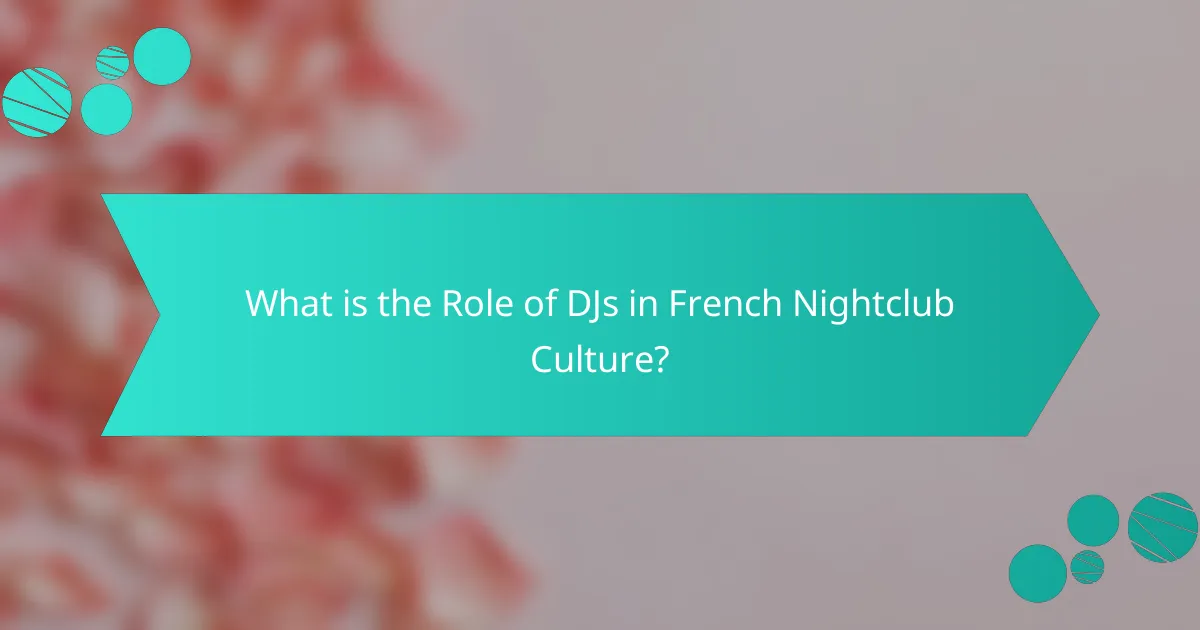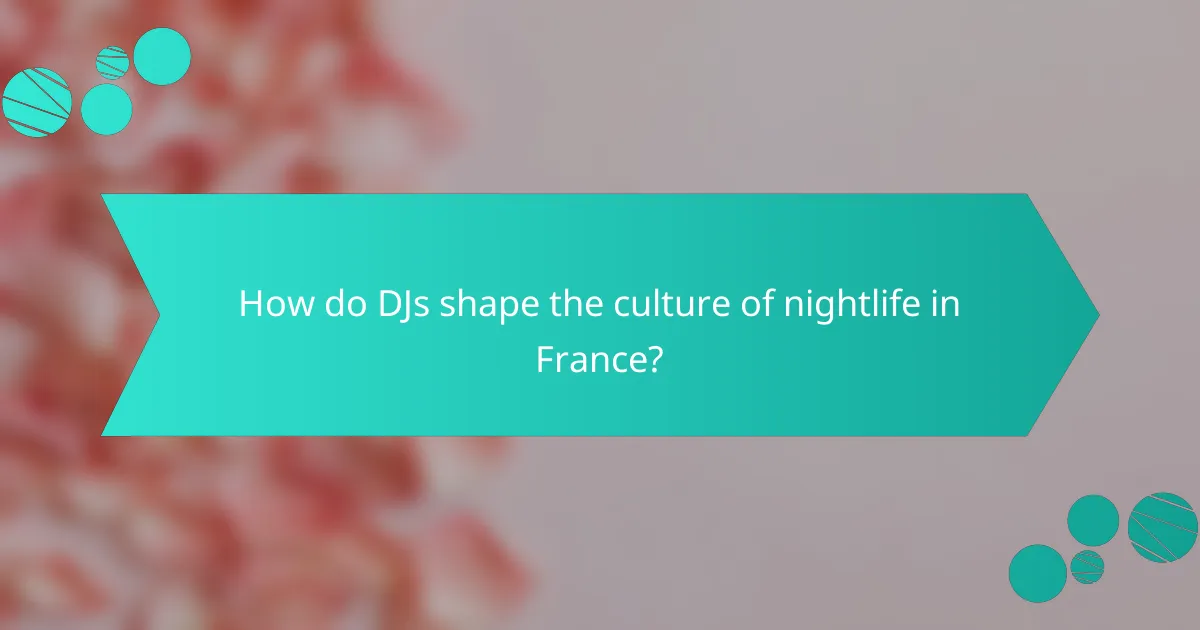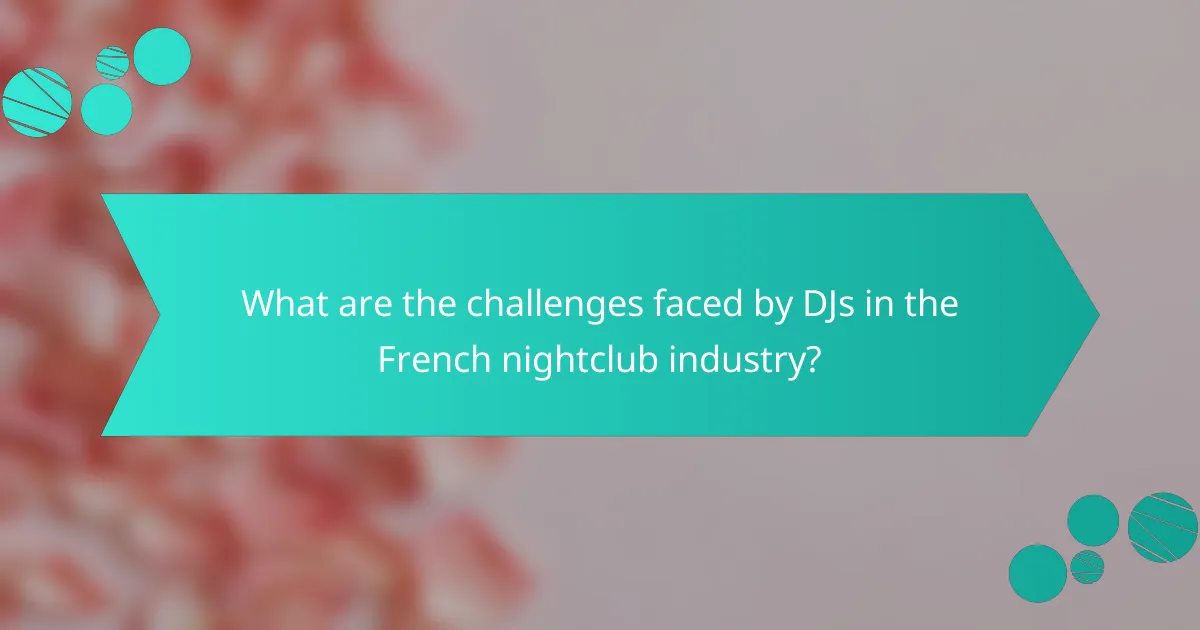DJs are pivotal figures in the French nightclub culture, responsible for curating musical experiences that shape social gatherings and nightlife. They blend various genres to create unique soundscapes, maintaining energy on the dance floor while engaging with the crowd. The influence of French DJs, such as David Guetta and Laurent Garnier, extends beyond local clubs to global music trends, impacting fashion, art, and social norms. However, they face challenges, including intense competition, evolving music trends, regulatory constraints, and the financial instability of nightclubs, exacerbated by the COVID-19 pandemic. This article explores the skills, popularity, and cultural influence of DJs within the vibrant context of French nightlife.

What is the Role of DJs in French Nightclub Culture?
DJs play a crucial role in French nightclub culture by shaping the musical experience and atmosphere. They curate playlists that resonate with diverse audiences. DJs also blend various genres, creating unique soundscapes that enhance the nightlife experience. Their skills in mixing and beatmatching keep the energy flowing on the dance floor.
Furthermore, DJs often interact with the crowd, responding to their energy and preferences. This connection fosters a communal atmosphere that is central to nightlife in France. The popularity of DJs has grown significantly, with many becoming cultural icons. For instance, French DJs like David Guetta and Laurent Garnier have influenced global music trends.
In summary, DJs are essential to the vibrancy of French nightclubs, driving musical innovation and community engagement.
How do DJs influence the atmosphere in French nightclubs?
DJs significantly influence the atmosphere in French nightclubs by curating music that resonates with the audience. They create a unique vibe through their selection of tracks, often blending various genres. This musical curation directly impacts the energy levels on the dance floor. DJs also read the crowd’s reactions to adjust their sets in real-time. For instance, a DJ may increase the tempo to elevate excitement during peak hours. Additionally, the use of lighting and effects coordinated with the music enhances the overall experience. In French nightclubs, DJs often serve as cultural icons, shaping trends and influencing social interactions. Their ability to connect with the audience fosters a sense of community and shared experience.
What techniques do DJs use to create a unique sound experience?
DJs use techniques such as beatmatching, mixing, and sampling to create a unique sound experience. Beatmatching involves aligning the tempo of two tracks to ensure a seamless transition. Mixing combines elements from different songs to create a new sound. DJs also use effects like reverb and delay to enhance audio. Looping allows DJs to repeat sections of a track, adding depth to the performance. Scratching is a technique that manipulates the sound of a record for artistic expression. These methods are essential in creating a distinctive auditory journey for the audience.
How does the choice of music affect clubgoers’ experiences?
The choice of music significantly influences clubgoers’ experiences. It shapes their emotional responses and overall enjoyment. Different genres evoke various feelings, such as excitement or relaxation. Research indicates that upbeat tempos enhance social interaction and energy levels. Conversely, slower music can create a more intimate atmosphere. A study by North and Hargreaves (2008) found that music style impacts patrons’ perceptions of time spent in clubs. Additionally, familiar tracks can trigger nostalgia, deepening emotional connections. Overall, the music selection directly affects mood, social dynamics, and satisfaction in nightlife settings.
What skills are essential for DJs in the French nightclub scene?
Essential skills for DJs in the French nightclub scene include technical proficiency, music selection, and crowd reading. Technical proficiency involves mastering DJ equipment and software. DJs must know how to mix tracks seamlessly. Music selection requires understanding various genres and trends. This skill helps in creating engaging sets that resonate with the audience. Crowd reading is crucial for adapting the performance to the energy of the room. Successful DJs can gauge the mood and respond accordingly. Networking is also important for building relationships within the industry. These skills collectively enhance a DJ’s ability to perform effectively in the vibrant French nightclub culture.
How do technical skills contribute to a DJ’s performance?
Technical skills are crucial for a DJ’s performance as they enable seamless mixing and sound manipulation. These skills include beatmatching, which allows DJs to synchronize tracks effectively. Additionally, EQing helps in enhancing sound quality by balancing frequencies. Looping and sampling contribute to creativity, allowing for unique remixes. DJs also use effects to add depth and excitement to their sets. Mastery of equipment, such as mixers and turntables, is essential for delivering a professional performance. A DJ’s technical proficiency directly influences audience engagement and overall atmosphere in a nightclub setting.
What role does creativity play in a DJ’s set?
Creativity is essential in a DJ’s set as it shapes the overall experience for the audience. A DJ uses creativity to select and mix tracks in innovative ways. This includes blending different genres and tempos to create a unique sound. The ability to read the crowd and adjust the music accordingly showcases a DJ’s creative skills. Additionally, creative transitions between songs enhance the flow of the set. DJs often incorporate original remixes or edits, adding a personal touch. This creative expression can elevate the atmosphere and engage the audience more deeply. Ultimately, creativity distinguishes a DJ’s performance from others, making it memorable.
What factors contribute to a DJ’s popularity in France?
A DJ’s popularity in France is influenced by their musical style, performance skills, and social media presence. The diversity of genres, such as house, techno, and electro, attracts various audiences. Skillful mixing and live performances enhance a DJ’s reputation. Engaging with fans on social media platforms increases visibility and support. Collaborations with other artists can also expand their reach. Participation in major festivals, such as Tomorrowland or Les Plages Électroniques, boosts recognition. Additionally, local connections and networking within the French music scene play a crucial role. These factors collectively shape a DJ’s standing in the competitive nightlife environment in France.
How does social media impact a DJ’s visibility and reach?
Social media significantly enhances a DJ’s visibility and reach. It allows DJs to showcase their music and performances to a global audience. Platforms like Instagram, Facebook, and TikTok enable real-time engagement with fans. A study by the International Music Summit found that 70% of electronic music fans discover new DJs through social media. This digital presence leads to increased booking opportunities. Social media also facilitates collaboration with other artists, expanding a DJ’s network. Additionally, targeted advertising on these platforms can attract new listeners. Overall, social media is a crucial tool for modern DJs to build their brand and connect with audiences.
What are the key elements that attract audiences to specific DJs?
Key elements that attract audiences to specific DJs include musical talent, unique style, and stage presence. Musical talent is essential for creating engaging sets that resonate with listeners. A unique style differentiates a DJ from others, often involving specific genres or mixing techniques. Stage presence captivates the audience, creating an energetic atmosphere. Additionally, audience interaction enhances the experience, making attendees feel connected. Social media presence also plays a role in building a fan base. Collaborations with popular artists can further increase visibility. Ultimately, these elements combine to create a compelling draw for audiences.

How do DJs shape the culture of nightlife in France?
DJs shape the culture of nightlife in France by curating musical experiences that define social gatherings. They select tracks that resonate with audiences, creating an atmosphere that encourages dancing and connection. The rise of electronic music has made DJs central figures in clubs and festivals. Events like the Paris Electronic Week showcase their influence on urban culture. DJs often collaborate with artists, enhancing the live music scene. Their ability to read the crowd allows them to adapt sets, ensuring engagement. French DJs have gained international recognition, further establishing France as a hub for nightlife. This influence shapes fashion, art, and social norms within the nightlife landscape.
What are the historical influences on DJ culture in French nightclubs?
DJ culture in French nightclubs has been significantly influenced by various historical factors. The emergence of disco in the 1970s laid the foundation for DJing as a profession. French clubs began adopting this style, integrating it with local music trends. The 1980s saw the rise of electronic music, particularly house and techno, which reshaped the nightclub scene. Key venues like the Palace in Paris became iconic for their innovative DJ performances. The rave culture of the 1990s further propelled DJs into the spotlight, emphasizing their role as cultural icons. Additionally, the influence of hip-hop introduced new mixing techniques and broader musical diversity. French DJs gained international recognition, contributing to a global exchange of styles and practices. These historical influences collectively shaped the unique identity of DJ culture in French nightclubs.
How have technological advancements changed DJing in nightclubs?
Technological advancements have significantly transformed DJing in nightclubs. Digital audio workstations (DAWs) allow DJs to mix and produce music more efficiently. Software like Serato and Traktor enables seamless integration of digital tracks. This technology supports real-time editing and manipulation of sounds. Additionally, MIDI controllers provide tactile control over virtual instruments and effects. Advanced sound systems enhance audio quality and create immersive experiences. Visual technology, such as LED screens and lighting systems, synchronizes with music for enhanced performances. These innovations have made DJing more accessible and dynamic, reshaping the nightclub experience.
What cultural movements have been associated with French DJs?
French DJs have been associated with several cultural movements, including house music, techno, and electro. House music emerged in the 1980s, originating from Chicago but gaining significant traction in France. French DJs like David Guetta and Laurent Garnier played pivotal roles in popularizing this genre. Techno, particularly from the 1990s, saw French artists like Jeff Mills and DJ Sneak influencing the scene. Electro emerged in the early 2000s, with artists like Justice and Daft Punk leading the charge. These movements have shaped the French nightlife and music landscape, creating a unique cultural identity.
How do DJs interact with their audiences during performances?
DJs interact with their audiences through various techniques during performances. They use eye contact to establish a connection. This engagement encourages audience participation. DJs also read the crowd’s energy to adjust their setlist. They may play popular tracks that resonate with the audience. Additionally, DJs often use gestures to invite the crowd to dance. This physical interaction enhances the overall experience. Furthermore, they sometimes use microphones to communicate directly with the audience. These interactions create a communal atmosphere in the nightclub setting.
What strategies do DJs use to engage clubgoers in their sets?
DJs use various strategies to engage clubgoers in their sets. They create a dynamic atmosphere by mixing tracks seamlessly. This keeps the energy high and encourages dancing. DJs also read the crowd’s reactions to adjust their playlist accordingly. They often use visual elements, such as lighting and video projections, to enhance the experience. Engaging in direct communication with the audience through shout-outs fosters a connection. Additionally, DJs may incorporate live remixes or mashups to maintain interest. These strategies are supported by the fact that audience engagement directly correlates with the overall enjoyment of the club experience.
How important is audience feedback in shaping a DJ’s performance?
Audience feedback is crucial in shaping a DJ’s performance. It directly influences song selection and energy levels. DJs often read the crowd’s reactions to adjust their sets in real-time. Positive feedback can encourage a DJ to play certain tracks longer. Conversely, negative reactions may prompt a quick change in music style. Studies show that audience engagement impacts the overall atmosphere of a nightclub. A well-received performance can enhance a DJ’s reputation and future bookings. Feedback also helps DJs understand their audience’s preferences better. This dynamic interaction is essential for a successful nightclub experience.

What are the challenges faced by DJs in the French nightclub industry?
DJs in the French nightclub industry face several challenges. One major challenge is competition among DJs, which is intense in urban areas. This competition can lead to lower fees as DJs undercut each other. Another challenge is the evolving music trends, requiring DJs to constantly adapt their playlists. Additionally, legal regulations regarding noise levels and licensing can restrict performances. The financial instability of nightclubs also poses a risk, affecting booking opportunities for DJs. Finally, the impact of the COVID-19 pandemic has resulted in reduced capacity and operational hours for nightclubs, further complicating the environment for DJs.
How do economic factors impact DJs and their performances?
Economic factors significantly impact DJs and their performances. The availability of disposable income influences ticket sales and event attendance. When the economy is strong, more people spend on nightlife experiences. Conversely, during economic downturns, attendance at clubs often decreases. DJ fees can also fluctuate based on economic conditions. In prosperous times, clubs may afford higher payments for popular DJs. During recessions, budgets tighten, leading to lower fees. Additionally, sponsorship and brand partnerships are affected by economic stability. Businesses are more likely to invest in events when they are financially secure. Overall, economic health directly shapes the DJ performance landscape, affecting both demand and compensation.
What are the common obstacles DJs encounter in their careers?
DJs commonly encounter obstacles such as competition, financial instability, and equipment issues. Competition is fierce in the music industry, making it challenging to stand out. Financial instability arises from inconsistent income, especially for freelancers. Equipment issues can include technical failures during performances, which can negatively impact reputation. Additionally, networking can be difficult, limiting opportunities for gigs and collaborations. Lastly, evolving music trends require DJs to continuously adapt their skills and playlists.
How do legal regulations affect DJ performances in nightclubs?
Legal regulations significantly impact DJ performances in nightclubs. These regulations govern licensing, noise levels, and copyright compliance. DJs must obtain specific licenses to play copyrighted music. Failure to do so can result in fines or legal action. Noise regulations limit sound levels to protect nearby residents. This can affect the volume and energy of DJ sets. Additionally, health and safety regulations ensure venues are safe for patrons. Compliance with these laws is essential for nightclub operations. Overall, legal regulations shape the environment in which DJs perform.
What best practices can DJs follow to succeed in the French nightlife scene?
DJs can succeed in the French nightlife scene by understanding local music preferences. Familiarity with genres like house, techno, and French touch is essential. Building a strong social media presence helps in connecting with the audience. Engaging with club promoters and networking is crucial for securing gigs. Mastering crowd reading skills allows DJs to adjust their sets effectively. Utilizing high-quality sound equipment ensures a professional performance. Staying updated with music trends keeps the DJ relevant in a competitive market. Collaborating with other artists can expand reach and influence.
How can DJs effectively promote themselves and their brand?
DJs can effectively promote themselves and their brand by utilizing social media platforms. Engaging content on platforms like Instagram and TikTok helps build a fanbase. Regularly sharing mixes and live performances can showcase their skills. Collaborating with other artists increases visibility and reach. Networking at events and festivals can create valuable connections. Maintaining a professional website allows for easy access to their music and contact information. Email marketing can inform fans about upcoming shows and releases. Utilizing analytics tools helps track engagement and optimize promotional strategies.
What networking strategies are beneficial for DJs in France?
Building strong relationships with venue owners is essential for DJs in France. This strategy allows DJs to secure regular gigs and gain exposure. Collaborating with other DJs can also enhance visibility. Joint performances can attract larger audiences. Engaging with local music communities fosters connections and support. Attending industry events helps DJs meet key players in the nightlife scene. Utilizing social media platforms is crucial for promoting events and networking. Sharing mixes online can showcase talent to a wider audience. Networking with promoters can lead to more booking opportunities. These strategies collectively enhance a DJ’s presence in the competitive French nightclub culture.
The main entity of this article is the role of DJs in French nightclub culture. It explores how DJs shape the musical experience and atmosphere, their influence on audience engagement, and the essential skills required for success in this vibrant scene. The article also examines the impact of social media on a DJ’s popularity, the historical influences on DJ culture, and the challenges faced by DJs in the industry. Additionally, it highlights best practices for DJs to promote themselves and succeed within the competitive nightlife landscape in France.